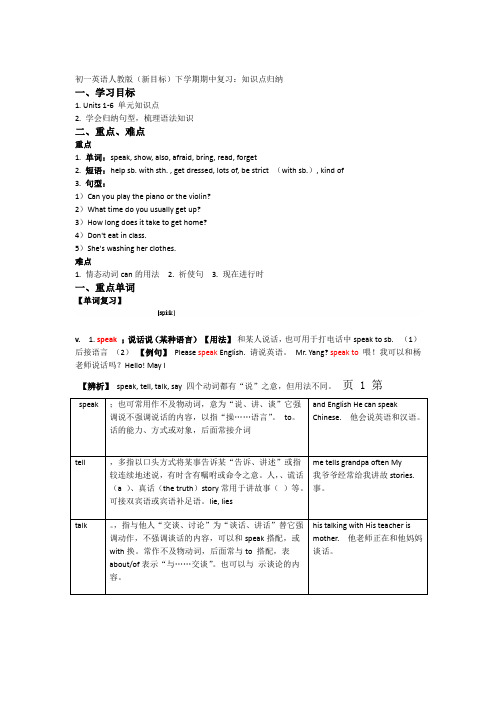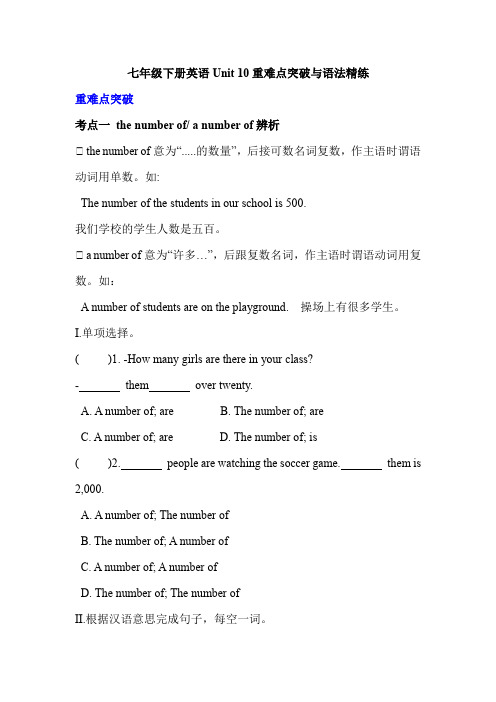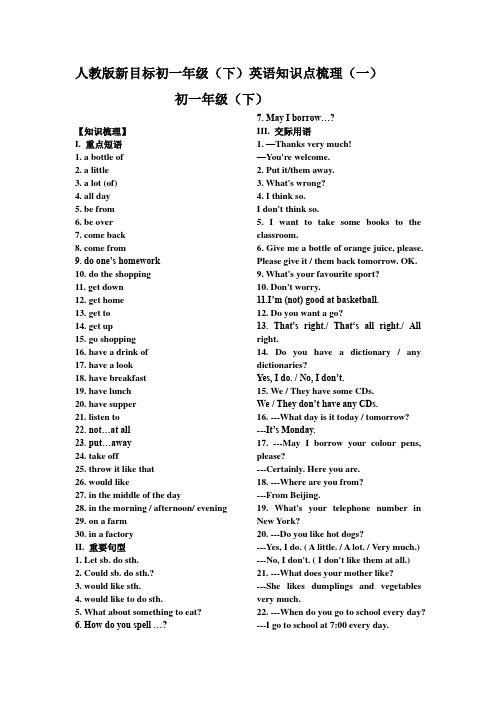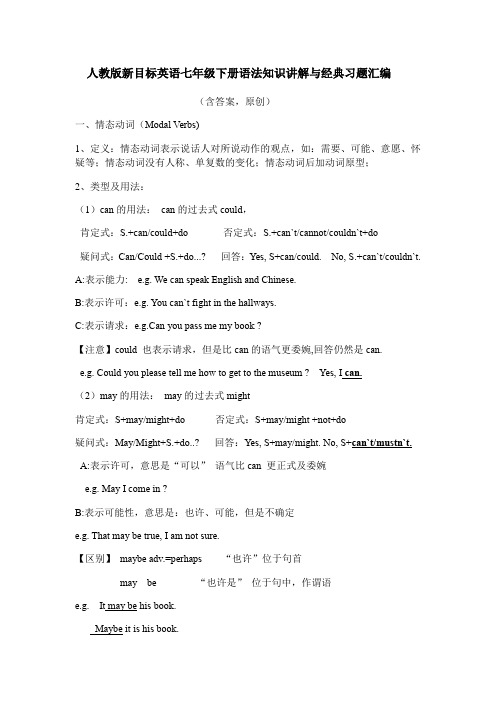新目标七年级英语(下册)重点难点考点精讲及练习,高分突破
- 格式:doc
- 大小:247.50 KB
- 文档页数:32

七年级英语重点难点精细讲解及练习(下册)Unit 1 ~ 4[考点聚焦]I. 词组归纳1. 在邮局和电子游戏中心之间_________,2. 在公用电话对面____________3. 带我的狗去散步_________________ ,4. 打的去…… _________________5. 玩得高兴_________________ ,6. 在附近_________________7. 直走_________________ ,8. 向左转_________________9. 在图书馆的右边________________ ,10. 欢迎来到花园小区!____________ 11. 一幢有一个美丽花园的房子_________,12. ……的开始__________________ 13. 一个消遣的好地方_________________,14. 去我家的路__________________ 15. 有点儿,稍微___________________ ,16. 在晚上___________________ 17. 吃草和树叶__________________ ,18. 想要,愿意__________________ 19. 青椒___________________ ,20. 冰茶___________________21. 也,还,而且___________________ ,22. 比萨快递___________________ 23. 点一份比萨___________________ ,24. 看菜单____________________ 25. 售货员_________________ ,26. 警官_________________27. 银行职员_________________ ,28. 警察局_________________29. 出去,外出_________________ ,30. 想成为_________________31. 与……一起工作__________________ ,32. 把某物给某人_________________ 33. 从某人处得到某物______________ ,34. 穿一套白色的制服____________ 35. 与某人交谈__________________ ,36. 参加校园剧的演出_____________ 37. 有一份护士的工作给你_____________,38. 5~12岁的儿童______________ II. 句型归纳1. _______ _______ a supermarket? No, there isn’t.2. _______ the park? It’s _______ Center Street.3. _______ the hotel? It’s next _______ the bank.4. _______ _______ he like koala bears? Because they’re _______ of cute.5. _______ _______ ________ pizza would you like?I’d like a pepperoni pizza, please.6. _______ _______ pizza would she like? _______ likes a medium pizza.7. _______ would they like _______ their pizza?They’d like mushrooms, onions and olives.8. _______ _______ he do? He’s a reporter.9. _______ _______ he? He’s a doctor.10. _______ _______ she want to _______? A sales assistant.III. 考点归纳1. 关于问路及回答的常用语1) Excuse me, is there a ...?Excuse me, where is the ...?Excuse me, which is the way to the ...?Excuse me, can you tell me the way to the ...?Excuse me, can you tell me how to get to the ...?Excuse me, how can I get to the ...?2) Go/Walk straight (along the street).Go/Walk along/up/down the street.Go/Walk along/up/down the street to the end.Go/Walk along/up/down the street about ten minutes.Turn (to the) left/right.Turn left/right at the traffic lights.Turn left/right at the second turning.(= Take the second turning on the left/right.)2. There’s a bank on the Central Street. 在中心路有一个银行。

初一英语人教版(新目标)下学期期中复习:知识点归纳一、学习目标1. Units 1-6 单元知识点2. 学会归纳句型,梳理语法知识二、重点、难点重点1. 单词:speak, show, also, afraid, bring, read, forget2. 短语:help sb. with sth. , get dressed, lots of, be strict (with sb.), kind of3. 句型:1)Can you play the piano or the violin?2)What time do you usually get up?3)How long does it take to get home?4)Don't eat in class.5)She's washing her clothes.难点1. 情态动词can的用法2. 祈使句3. 现在进行时一、重点单词【单词复习】v. 1. speak;说话说(某种语言)【用法】和某人说话,也可用于打电话中speak to sb. (1)后接语言(2)【例句】Please speak English. 请说英语。
Mr. Yang? speak to 喂!我可以和杨老师说话吗?Hello! May I【辨析】speak, tell, talk, say 四个动词都有“说”之意,但用法不同。
页 1 第【考题链接】. ”My mother ______, “I want to _____ you a story in EnglishD. talks; say C. says; tell B. speaks; tell A. says; talkC答案:是第三人称单数,my mother say ;思路分析:根据后面是妈妈说的内容,故第一空用正确。
句意为:我妈后可接双宾语,故选项C ;根据you a story 可知tell 故谓语动词用says “我想用英语给你讲个故事”。

新目标初一英语下知识总结及练习答案讲解公司内部档案编码:[OPPTR-OPPT28-OPPTL98-OPPNN08]七年级英语提高训练(一)Unit 1 Can you play the guitar?学校:年级:姓名:一. 基础知识梳理A.)考点词汇B.)考点短语C.)考点句型A: Can you draw B: Yes, I can. I want to join the art club.C: Can you swim D: No, I can’t.E: Oh, can you sing F: Yes, I can. I want to join the music club.D.)考点语法:情态动词can的使用1.)表示能力,表“会”“能”,指脑力或体力方面的“能力”--- I can play basketball well.2.)表示许可----You can’t play here.3.)表“请求”--- Can you help me二.基础知识运用1.根据首字母和句意提示完成单词。
1. He likes playing basketball. So he wants to join_______ the basketball club.2. ---Can you speak_____ English? ---Yes, I can.3. I can paint . I want to join the art club.4. I can play the guitar and the volin . I can sing and dance, talk .5. Do you have time on the weekend .6. If you are a good musician , you can be in the music festival festival.7. What can you do in the school show8. Which do you like, English or Chinese2.单项选择( B ) 1. ----Can you----Yes. I am in the art club now.A. swimB. paintC. danceD. sing( D ) 2. ----Can you play the guitar----Yes. But I can’t play it very .A. badB. badlyC. goodD. Wellvery good相当于very nice. 意思是非常好,用来修饰名词.例子:The book is very good/nice.这本书非常好.very well 意思也是非常好,但它有两个用途:1.表示人的身体很好,属于形容词性短语,仅限于表示人的身体好,假如你跟一个人偶遇,他就想问问你认识的某人身体咋样,那你就可以回答说谁谁谁very well.例子:My mother is very well.我妈妈身体很好.2.还可以用来表示很好地,这时候它就相当于一个副词,可以用来修饰动词和形容词.例子:He study English very well.他的英语学得非常好.( A ) 3. ---- ----Chess club.A. What club do you want to joinB. Can you play the chessC. What can you doD. Do you join the chess club?( B ) 4. ----Do you know Lang Lang---Yes. He is a . He can play the piano very well.A. playerB. musicianC. teacherD. singer( C ) 5. ----How is your school trip----Great. I can you the photos.A. makeB. findC. showD. buy( D ) 6. ----Can you me with my English ---OK.A. learnB. speakC. teachD. Help help with帮助( B ) 7. ----Can your friend, Tony, the trumpet喇叭;小号----Yes. He likes it very much.A. play; playsB. play; playingC. plays; playsD. plays;playingyour friend和Tony之间是同位关系,实际上该句子相当于:Can your friend playthe trumpet当表示喜欢某事物,而且以前就喜欢,还可能持续,用Like doing sth 当表示想要,欲做某事用like to do( B ) 8. ---What does he like doing after school---Playing .A. gameB. chessC. the tennisD. Swimming games( c ) 9. ----Can I help you--- I want to buy a book.A. No, thanksB. Thanks a lot 十分感谢C. Yes, please.D. You’re welcome 不客气 thank you或者Thanks a lot用这个回答( A ) 10. Can he Englishl?A. speakB. talkC. sayspeak 意为“说话、讲话”,后面主要接语言.如:He can speak English and a little Chinese.talk 意为“谈话、讲话”,如果只有一方对另一方说话时,一般用 talk to;如果双方或多方交谈,多用 with.say 意为“说”通常跟讲者所说的话一起使用Please say hello / thank you to your mum.( B ) 11. My brothers want the chess club.A. to speakB. to joinC. joinswant to do想做某事,want意思是“想要”,主语常是人I want to go to schoolwant doing 需要做某事,want意思是“需要、要求”,主语常是物The house wants repairing( C ) 12. ----Can you play the guitar----A. No, I canB. Sure, I can’tC. Yes, a little.( B) 13. My sister can very well. So she wants to join theclub.A. swims; swimmingB. swim; swimmingC. swimming; swim( C ) 14. _______club do you want to join?A. WhenB. WhereC. What( C ) 15. I don’t want to play _____violin. Let’s go and play ________ping-pong.A. a; theB. the; aC. the; /接球类和棋类时不加冠词,如:play football, play ping-pong,play chess。

七年级下册英语Unit 10重难点突破与语法精练重难点突破考点一the number of/ a number of辨析★ the number of意为“.....的数量”,后接可数名词复数,作主语时谓语动词用单数。
如:The number of the students in our school is 500.我们学校的学生人数是五百。
★ a number of意为“许多…”,后跟复数名词,作主语时谓语动词用复数。
如:A number of students are on the playground. 操场上有很多学生。
I.单项选择。
( )1. -How many girls are there in your class?- them over twenty.A. A number of; areB. The number of; areC. A number of; areD. The number of; is( )2. people are watching the soccer game. them is 2,000.A. A number of; The number ofB. The number of; A number ofC. A number of; A number ofD. The number of; The number ofII.根据汉语意思完成句子,每空一词。
3.有许多学生在教室里。
There are students in the classroom.4.在我们学校,女老师的数量是八十。
the woman teachers is eighty in our school.考点二不可数名词的数量的表达★不可数名词的数量一般用some,much,a lot of,lots of,a bit of,a little,little等词表示。
如some meat一些肉; a little water一点水。

人教版新目标初一年级(下)英语知识点梳理(一)初一年级(下)【知识梳理】I. 重点短语1. a bottle of2. a little3. a lot (of)4. all day5. be from6. be over7. come back8. come from9. do one‟s homework10. do the shopping11. get down12. get home13. get to14. get up15. go shopping16. have a drink of17. have a look18. have breakfast19. have lunch20. have supper21. listen to22. not…at all23. put…away24. take off25. throw it like that26. would like27. in the middle of the day28. in the morning / afternoon/ evening29. on a farm30. in a factoryII. 重要句型1. Let sb. do sth.2. Could sb. do sth.?3. would like sth.4. would like to do sth.5. What about something to eat?6. How do you spell …?7. May I borrow…?III. 交际用语1. —Thanks very much!—You're welcome.2. Put it/them away.3. What's wrong?4. I think so.I don't think so.5. I want to take some books to the classroom.6. Give me a bottle of orange juice, please. Please give it / them back tomorrow. OK.9. What's your favourite sport?10. Don't worry.11.I‟m (not) good at basketball.12. Do you want a go?13. That's right./ That…s all right./ All right.14. Do you have a dictionary / any dictionaries?Yes, I do. / No, I don‟t.15. We / They have some CDs.We / They don‟t have any CDs.16. ---What day is it today / tomorrow?---It‟s Monday.17. ---May I borrow your colour pens, please?---Certainly. Here you are.18. ---Where are you from?---From Beijing.19. What's your telephone number in New York?20. ---Do you like hot dogs?---Yes, I do. ( A little. / A lot. / Very much.) ---No, I don't. ( I don't like them at all.) 21. ---What does your mother like?---She likes dumplings and vegetables very much.22. ---When do you go to school every day? ---I go to school at 7:00 every day.23. ---What time does he go to bed in the evening?---He goes to bed at 10:00.IV. 重要语法1.人称代词的用法;2. 祈使句;3. 现在进行时的构成和用法;4.动词have的用法;5.一般现在时构成和用法;6.可数名词和不可数名词的构成和用法初一年级(下)英语知识点梳理(二)【名师讲解】1. That's right./ That…s all right./ All right. That‟s right意为“对的”,表示赞同对方的意见、看法或行为,肯定对方的答案或判断。

人教版新目标英语七年级下册语法知识讲解与经典习题汇编(含答案,原创)一、情态动词(Modal Verbs)1、定义:情态动词表示说话人对所说动作的观点,如:需要、可能、意愿、怀疑等;情态动词没有人称、单复数的变化;情态动词后加动词原型;2、类型及用法:(1)can的用法:can的过去式could,肯定式:S.+can/could+do 否定式:S.+can`t/cannot/couldn`t+do疑问式:Can/Could +S.+do...? 回答:Yes, S+can/could. No, S.+can`t/couldn`t.A:表示能力: e.g. We can speak English and Chinese.B:表示许可:e.g. You can`t fight in the hallways.C:表示请求:e.g.Can you pass me my book ?【注意】could 也表示请求,但是比can的语气更委婉,回答仍然是can.e.g. Could you please tell me how to get to the museum ? Yes, I can.(2)may的用法:may的过去式might肯定式:S+may/might+do 否定式:S+may/might +not+do疑问式:May/Might+S.+do..? 回答:Yes, S+may/might. No, S+can`t/mustn`t.A:表示许可,意思是“可以”语气比can 更正式及委婉e.g. May I come in ?B:表示可能性,意思是:也许、可能,但是不确定e.g. That may be true, I am not sure.【区别】maybe adv.=perhaps “也许”位于句首may be “也许是”位于句中,作谓语e.g. It may be his book.Maybe it is his book.(3)must的用法:肯定式:S+must+do 否定式:S+mustn`t +do疑问式:Must+S+do...? 回答:Yes, S.+must. No, S.+needn`t.A:表示“必须、一定”e.g. You must do your homework in the evening.B:与have to的区别:(A)have to do 表示“不得不”,e.g. I have to study at home because of COVID-19.(B)Must 表示说话人的主观看法,have to往往表示说话人的客观需要:e.g. I have to go home because it is too late.I must study hard at English.(C)否定式含义不同:mustn`t “不准、禁止”don`t have to “不必要”e.g.You mustn`t play soccer on the street. It is too dangerous.You don`t have to come because it is too late.(D)must只表示现在,没有人称和数的变化,have to有不同时态、人称及数的变化:e.g. She has to do her homework at school.He must come back home today.3、经典习题:(1)---.May I go shopping with you , Mum ?--No, you .You do your homework now.A.mayn`t, mustB. can`t, mustC. mustn`t, canD.mayn`t, have to(2)--.Must I clean the classroom now, Miss Green ?--- No, you . You clean it after school.A.mustn`t, mayB.can`t, mayC.needn`t, mayD.don`t have to, must(3).--Could you please help me with my homework, Jack ?---Sorry, I . You think about it by yourself.A.can`t, mustB.couldn`t, mustC.can`t, couldD.could, must(4).Mr.Green at home. But I am not sure.A.maybeB. can beC.must beD.may be(5).You make breakfast every morning. We have it at school.A.don`t have to, canB.mustn`t, mustC.can`t, canD.mayn`t, may(答案:BCADA)二、现在进行时(Present Progressive Tense)1、定义:表示现在(说话瞬间)、当前一段时间的活动或现阶段正在进行或发生的动作;2、.肯定式:S.+am/is/are+doing 否定式:S+am/is/are+not+doing疑问式:Am/Is/Are +S.+doing...? 回答:Yes, S+am/is/are. No, S+am not/isn`t/aren`t.3、现在分词(doing)的变化规则:A:一般的情况,直接在动词末尾加ing, e.g. say--saying, talk--talkingB:以不发音字母e结尾的情况,去掉e,再加ing, e.g. make---making【注意】see--seeing be--beingC:如果动词的最后一个音节是重读闭音节及末尾三个字母是“辅音字母+元音字母+辅音字母”,先双写最后一个辅音字母,再加ing, e.g. shop---shoppingget--getting sit--sitting run--running put--putting【思考】listen--wait---open--eat--4、时间状语或标志词/组:now/listen/look/at this time/It is ...o`clock./上下文e.g.Look! The boy is reading English.【注意】现在进行时也表示现在经常反复发生的动作:e.g.The boy`s mother is always saying , “Don`t be late for school.”某些动词的进行时的形式也可以表示将来时,如:go/come/leave等e.g. Be quick ! The bus is coming.5、经典习题:(1)Who . to the radio ? Some old men are.A. are listeningB.is listeningC.listenD.listens(2) Peter`s and milk at the table now.A. siting, drinkingB.sitting, drinksC.sitting, drinkingD.sit, drink(3)---Where is your mother?-- She with my math teacher in the classroom.A.talksB.is talkingC.talkingD.is talks(4)It is six o`clock in the evening. The Greens dinner.A. is havingB.are havingC.hasD.have(5)Tom , but his brother . .A.is drawing,isB.isn`t drawing, isC.is drawing, doesD.isn`t drawing, doesn`t(答案:BCBBB)三、一般过去时(Simple Past Tense)1、定义:表示过去某个时间或一段时间内发生的动作或存在的状态,也表示过去经常或反复发生的动作,常和often/always等频度副词连用;2、动词be的句型:肯定式:S.+ was/were+... 否定式:S.+wasn`t/weren`t+...疑问式:Was/Were+ S. +...? 回答:Yes, S.+was/were. No, S.+wasn`t/weren`t.3、行为动词的句型:肯定式:S.+did+... 否定式:S.+didn`t+do...疑问式;Did+S.+do...? 回答:Yes, S. +did. No, S.+didn`t.4.规则动词的过去式构成:A:一般的情况:在动词末尾加ed, e.g. look--looked, talk--talkedB:以e结尾的动词,加d, e.g. live--lived, hope--hopedC:如果动词的最后一个音节是重读闭音节及末尾三个字母是“辅音字母+元音字母+辅音字母”,先双写最后一个辅音字母,再加ed, e.g. shop--shoppedD:以辅音字母+y结尾的动词,改y为i,加ed, e.g. study--studied【注意】不规则动词的过去式构成见课本后面P141,过去式的读音规则见课本P114.的表格。
Unit 1Can you play the guitar?【学习目标】1. 掌握表示爱好的单词.2.熟练的谈论表示能力的话题,以及自己的意愿.【学习重点】1.情态动词can小结:后面总是接动词原形,没有人称和数的变化。
意思是“能,会”。
用法口诀:情态can表能力,和行为动词不分离。
不管主语如何变,can的模样永不变。
只要出现动词can,动词原形后面站。
一般疑问can提前,否定can后not添。
2. play的用法小结:play与体育、棋类词语连用时,不加定冠词theeg: play basketball, play chess, play cardsplay与乐器类词语连用时要加定冠词theeg: play the guitar,play the piano play the drum,play the violinUnit 2 What time do you go to school?【学习目标】:1.能够利用所学句型询问及表述时间。
2.掌握时间表达法3.进一步掌握what time和when引导的疑问句4.掌握usually, always never, on weekends 等词的用法。
Unit 3 How do you get to school?【学习目标】【学习重点】:1.学习单词和短语sixty ,seventy, eighty, ninety, hundred,minute , kilometer, new, every day, by bike.2.句型:How long does it take? How far is it ?3、学习how对交通方式提问的特殊疑问句。
4、谈论如何到达某地;学会用how 来问路;5、并学会谈论自己或他人的健康生活方式。
Unit 4 Don’t eat in class.【学习目标】【学习重点】:1、巩固祈使句的用法;2、学习情态动词can表示许可的肯定句、否定句、一般疑问句及肯定、否定回答。
新目标英语七年级下册Unit1-3重难点知识点知识点大全Unit 1知识点复习Unit 1 Can you play the guitar?一、重点词汇1.词形变化:(1)sing (v.)唱歌—_______ (n.)歌手(2)dance(v.)跳舞—_______ (n.)舞蹈家(3)teach(v.)教—_______ (n.)教师(4)swim(v.)游泳—_______ (n.)游泳者(5)speak(v.)说—______ (n.)说话者;演讲者(6)write(v.)写—_______ (n.)作家(7)play (v.)玩—_______ (n.)运动员;播放器(8)story (n.) 故事;小说—_______(复数)(9)people(n.) —_______(集体名称、单复数同形)人;人们—_______(复数)民族(10)g ood (adj.) —_______(adv.) “好”(11)m usic (n.)音乐—________(n.)音乐家________(adj.)音乐的(12)l et’s = _______ can’t = ______(13)c enter = _______ 中央;中心(14)w eekend = ____________________周末(15)o n weekends = _________ 在周末(16)b e good at = ________擅长做某事(17)t oo(肯句末,逗隔开)= _____ (肯句中,be、情、助动后,实动前)/ ______(否句末,逗隔开)“也”(18)f ree adj.—_______ adj.(反义词)(19)e asy adj. —_______ adj.(反义词)=________(同义词)(20)join sb. = _________ = __________(同义词)加入某人(使其成为其中一员)(21)b e good with sb, =_______和某人相处得好(22)w ant = _______ “想要”(23)W hat about you? = ______________?(同义句)2.重点单词:(1)名词(n.)乐器名称:钢琴_______ 小提琴_______ 吉他_______ 鼓_______球类名称:足球_______ 篮球_______ 网球_______ 棒球_______乒乓球_______ 排球_______ 羽毛球_______ 高尔夫球_______语言:汉语_______英语_______日语_______法语_______其他:象棋_______俱乐部_______ 故事;小说_______ (中国)功夫______ 人(们)______家______ 中心;中央_______ 周末_______ 音乐家_______ (2)动词(v.)唱歌_______ 跳舞_______ 画画_______ 讲诉;告诉_______写作;写字_______ 参加;加入_______ 游泳_______ 说话_______ 展示;给……看_______ 说话;交谈_______ 制造_______ 教;讲授_______ (3)副词(adv.)也;而且_______ 今天_______(4)连词(conj.)或者;也不(用于否定句)_______3.易错知识点(1)good与well的区别运用;(2)be good with与be good at/be good for/ begood to的区别运用;(3)tell, say, speak, talk的区别运用;(4)join与join in的区别运用;①. join v. 参加,加入它是短暂性动词,不能和一段时间连用。
七年级英语下册高频易错点讲解练习Unit 1一、speak,tell,talk,say的用法speak: 讲语言,强调说的动作,不强调内容;➡speak to sb.about sth.➡speak+ 某种语言tell: 告诉,及物动词,接双宾语,➡tell sb.sth.=tell sth.to sb.➡tell sb.to do sth.say: 说,及物动词,强调言语内容➡say sth.to sb.talk: 交谈,聊天,不及物动词➡talk to sb., talk with sb.,【练习】1.Mr.Wu wants to_____to his son.2.Jenny and Mary are good at_______English.3.She_________us interesting stories.4.Our teacher often______us to go to school early.5.My teacher often_____she can play chess.【答案】1.talk/ speak2.speaking3.tells4.tell5.say二、be good at, be good with,be good for的用法be good at:擅长,与do well in可以同义替换be good with: 善待,与...相处好,善于应付...的be good for: 对...有益,对应短语be bad for(对...有害)【练习】1.---Are you good_______your students? ---Yes, I am.A.atB.withC.forD.of2.Tom is good_______speaking English.A.atB.withC.forD.of3.Vegetables and fruit are good_______us.A.atB.withC.forD.of【答案】1.B2.A3.C三、can的用法①情态动词,后接动词原形,没有人称和数的变化②否定句直接在can后加not, can not=can't, 疑问句把can放到句首③过去式为could1.My brother_______the trumpet and he plays it_____.A.can play; goodB.can't play; goodC.can play;wellD.doesn't play; well2.---Hi,can I help you?---________.A.Yes,pleaseB.No,I can'tC.Yes,I canD.You're welcome3.Tom can swim.(改为一般疑问句,并作肯定、否定回答)______Tom_______?______, _____ ______.______, _____ ______.4.Lucy and Lily can dance and sing.(改为否定句)Lucy and Lily ______dance_______sing.【答案】1.C2.A3.Can/ swim/ Yes, he can./ No , he can't.4.can't/ or四、play的用法①后接游戏,球类运动,棋牌,不加the②后接乐器,要加the关于【拉二胡】,教材给的是play the erhuplay sports 做运动, sports用复数【练习】1.他喜欢玩电脑游戏。
七年级英语重点难点精细讲解及练习(下册)Unit 1 ~ 4[考点聚焦]I. 词组归纳1. 在邮局和电子游戏中心之间_________,2. 在公用电话对面____________3. 带我的狗去散步_________________ ,4. 打的去…… _________________5. 玩得高兴_________________ ,6. 在附近_________________7. 直走_________________ ,8. 向左转_________________9. 在图书馆的右边________________ ,10. 欢迎来到花园小区!____________ 11. 一幢有一个美丽花园的房子_________,12. ……的开始__________________ 13. 一个消遣的好地方_________________,14. 去我家的路__________________ 15. 有点儿,稍微___________________ ,16. 在晚上___________________ 17. 吃草和树叶__________________ ,18. 想要,愿意__________________ 19. 青椒___________________ ,20. 冰茶___________________21. 也,还,而且___________________ ,22. 比萨快递___________________ 23. 点一份比萨___________________ ,24. 看菜单____________________ 25. 售货员_________________ ,26. 警官_________________27. 银行职员_________________ ,28. 警察局_________________29. 出去,外出_________________ ,30. 想成为_________________31. 与……一起工作__________________ ,32. 把某物给某人_________________ 33. 从某人处得到某物______________ ,34. 穿一套白色的制服____________ 35. 与某人交谈__________________ ,36. 参加校园剧的演出_____________ 37. 有一份护士的工作给你_____________,38. 5~12岁的儿童______________ II. 句型归纳1. _______ _______ a supermarket? No, there isn’t.2. _______ the park? It’s _______ Center Street.3. _______ the hotel? It’s next _______ the bank.4. _______ _______ he like koala bears? Because they’re _______ of cute.5. _______ _______ ________ pizza would you like?I’d like a pepperoni pizza, please.6. _______ _______ pizza would she like? _______ likes a medium pizza.7. _______ would they like _______ their pizza?They’d like mushrooms, onions and olives.8. _______ _______ he do? He’s a reporter.9. _______ _______ he? He’s a doctor.10. _______ _______ she want to _______? A sales assistant.III. 考点归纳1. 关于问路及回答的常用语1) Excuse me, is there a ...?Excuse me, where is the ...?Excuse me, which is the way to the ...?Excuse me, can you tell me the way to the ...?Excuse me, can you tell me how to get to the ...?Excuse me, how can I get to the ...?2) Go/Walk straight (along the street).Go/Walk along/up/down the street.Go/Walk along/up/down the street to the end.Go/Walk along/up/down the street about ten minutes.Turn (to the) left/right.Turn left/right at the traffic lights.Turn left/right at the second turning.(= Take the second turning on the left/right.)2. There’s a bank on the Central Street. 在中心路有一个银行。
在路上:in/on the street高分突破:以上两个短语可互换,当出现具体的门牌号时介词用at,例如:at Central Street No. 17 在中心路17号3. Turn left off the busy First Avenue and enjoy the city’s quiet streets and small parks.向左转出第一大道,你可以欣赏到城市里宁静的街道和小公园。
enjoy v. 喜欢,欣赏1) enjoy sth.Do you enjoy the dinner tonight?2) enjoy + doing sth. 喜欢做某事Jack enjoys playing the drum.3) enjoy oneself 玩得高兴=have a good time=have funThey enjoyed themselves in the zoo yesterday.=They had a good time in the zoo yesterday.=They had fun in the zoo yesterday.4. Take a walk through the park on Central Avenue.步行穿过中心大道的公园。
1) 散步: take a walk have a walk go for a walk walk2) through 穿过(立体的)……across穿过(平面的)……例如:go/walk/run/drive through the rain/ forest/ citygo/walk/run/drive across the street/ road/ bridge/ avenueswim across the river高分突破:Go through the street. 顺着这条街走。
Go across the street. (横穿)过马路。
5. Next to the hotel is a small house with an interesting garden.在宾馆旁边是一幢有一个有趣花园的小房子。
1) 形容词作定语修饰名词放在名词的前面,例如:a new teacher a fantastic movie an exciting soccer ball game2) 形容词修饰不定代词放在不定代词的后面, 例如:something dangerous anything different3) 介词短语、分词作定语放在所修饰词的后面,例如:a T-shirt like thisa student in No.14 Middle Schoolthe boy with short curly hairthe girl in red sweaterthe man wearing a pair of new shoesthe kite made buy Lucy高分突破:对介词短语、分词定语提问时疑问代词常用whichThe man in the car is my father.Which man is your father?6. This is the beginning of the garden tour.这是花园旅行的开始。
1) at the beginning of :在...开始的时候,例如:at the beginning of this week/ monthAt the beginning of a math class she usually asks a question.Tom sings a song at the beginning of the music festival.反义词组:at the end of :在...结束的时候at the end of this year/ February/ Unit Two2) in the beginning 在开始的时候,例如:He couldn’t speak Chinese at all in the beginning.反义词组:in the end 最后3) beginner 初学者7. Let me tell you the way to my house.让我告诉你去我家的路。
1) the way to …… 到……去的路the answer to …… ……的答案the key to …… ……的答案,……的钥匙the guide to …… ……的指南the direction to …… 到……去的路、方向2) on the way to …… 在去……的路上on one’s way to …… 在某人去……的路上in one’s way to …… 挡在某人去……的路上高分突破:在这几个短语中如果后接home, here, there这几个副词,须将to去掉。
例如:on the way home/ here/ there8.Why do you like them? Because they’re kind of cute.你为什么喜欢它们?因为它们有点可爱。